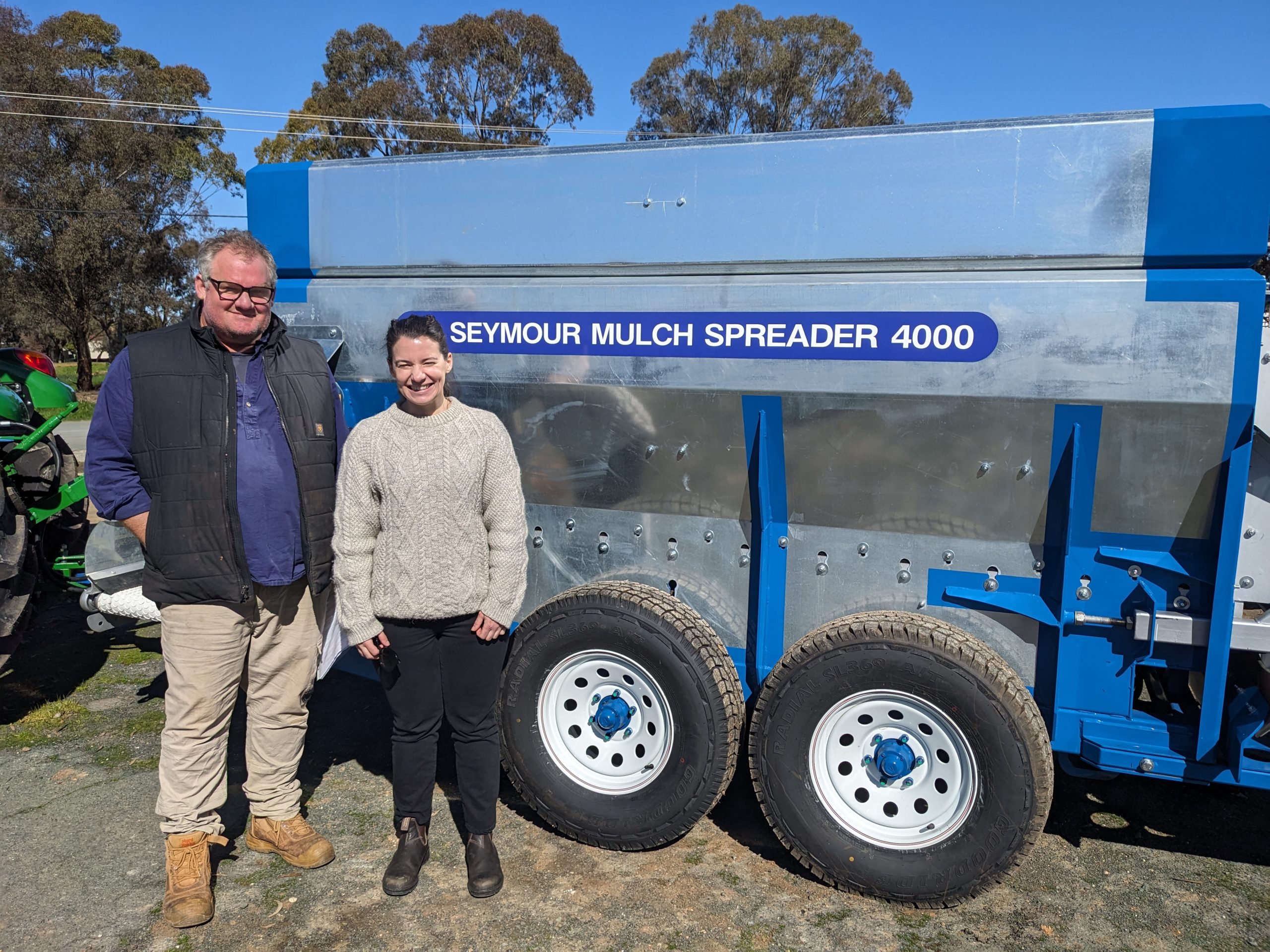Hugh Jones from Humis Vineyard and Madeleine Marson from Vinea Marson in front of the shared mulch spreader. Image courtesy Sustainability Victoria
A recent trial at Macedon Ranges vineyards has shown that composted recycled green waste collected from suburban green bins can create healthier vines and higher grape yields when used as mulch.
Sustainability Victoria provided funding to Melbourne Water to lead the 3-year project to demonstrate the benefits of using composted recycled urban green waste as an undervine cover and increase its adoption in cool climate vineyards.
Two vineyards tested recycled organic fine compost and composted mulch in vine rows compared to a control row using standard practices (brush cutting and herbicide under vine). Electronic data loggers monitored temperature in the vine canopy and in the soil, while the assessment of grape quality and yield took place during every annual harvest.
Lead researcher Erika Winter from GrapeLinks said results showed that weed control was excellent in the vineyards using composted mulch, which meant that the vineyards did not have to undertake a summer herbicide application.
Lab testing found that composted mulch improved nutrient levels in petioles, vine vigour, and yield (though yield varied year on year due to different make-up of the recycled organics).
But to the all-important question – did the grapes taste better? Their ripeness at harvest, the ‘brix’, was slightly enhanced by mulch and compost; titratable acidity, colour and phenolics were found to be higher with recycled composted mulch than over fine compost or the control.
The researchers suggested that custom-made recycled organic composted mulches and composts for viticulture could be the next step in seeking improvements for both grape growers and the organics recycling industry.
Melbourne Water has developed an online cost calculator to help growers to determine the cost and required amount of compost per hectare at various row widths and application rates of product.
Through $343,000 in funding from Sustainability Victoria, this Macedon Ranges trial was just one of three projects in Victoria’s wine regions demonstrating the role recycled organics can play in wine production.
Increasing efficiencies
A trial project in the Yarra Valley wine region, led by Total Viticulture Solutions (TVS), has been increasing compost spreading efficiencies.
Cameron McIntosh from TVS explained that the amount of recycled compost being utilised in regions has increased by addressing a key barrier to use. By transforming a wheeled bobcat to a Posi-Track loader, they’ve seen spreading efficiency gains of up to 70%, decreasing the overall cost of applying recycled compost and mulch products to vineyards.
“The costs of spreading equipment and labour can be a deterrent to smaller vineyards,” said McIntosh. “But if a contractor like me can offer it to the entire market, then it’s a solution for the entire industry.”
The loader has allowed the wineries to extend the season as well, because they can continue to work in wet and muddy weather, conditions the Yarra Valley is renowned for.
“We’ve seen phenomenal things through compost,” explained McIntosh. “It’s a resource available to everybody and not at a huge cost. From what we’re seeing in the guys who are using it, the quality improvements in their vineyards are astonishing.”
Equipment sharing
A group of 64 vineyards across Victoria’s Heathcote region have jointly purchased equipment through a Sustainability Victoria grant to improve the efficiency of spreading recycled organic compost under the vines.
The participant vineyards can access two tractors, a spreader and a pressure washer at a reduced cost, along with discounted compost from BioMix.
Hugh Jones, from Heathcote winery Humis Vineyard, said that while there has always been an appetite for using compost in their region, it’s been difficult to do it at a scale due to cost and availability of equipment.
“The size of the spreader means vineyards can distribute more compost in less time, which also saves on labour costs,” he said.
Jones said that while the group has just completed the first 15 months of the 5-year project, the results are so far encouraging. “We’ve spread something like 2,600 tonnes of compost, which for the region means we’ve saved the 5,250 tonnes of greenhouse gas emissions.”
Sustainability Victoria’s Markets Acceleration Manager Shannon Smyth said these projects are a wonderful’ illustration of the circular economy in action.
“Taking our food and organic waste and transforming it into high-quality compost and mulch that vineyards can use to improve soil health means we can grow the market for recycled organics and divert more waste from landfill.”
Are you a Daily Wine News subscriber? If not, click here to join our mailing list. It’s free!















